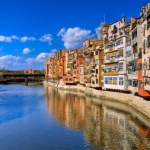Description Girona, Spain
 At first glance, the Catalan city of Girona seems very ordinary, no frills. Quiet streets, occasional passers-by. Some kind of life that is observed only in restaurants and cafes, where visitors from the heat razomlevshie lazily sipping refreshing wine and chew Crown dish Girona - bread with tomatoes. In general, a sleepy town with endless siesta. But this is misleading, the true face of the city curtained colored walls of houses strung out along the river Onyar. These colorful facades are the gateway to the inner world of Girona in its history.
At first glance, the Catalan city of Girona seems very ordinary, no frills. Quiet streets, occasional passers-by. Some kind of life that is observed only in restaurants and cafes, where visitors from the heat razomlevshie lazily sipping refreshing wine and chew Crown dish Girona - bread with tomatoes. In general, a sleepy town with endless siesta. But this is misleading, the true face of the city curtained colored walls of houses strung out along the river Onyar. These colorful facades are the gateway to the inner world of Girona in its history. Located 100 km from Barcelona and 60 km from France, Girona is a cultural, political and economic center of the province of Girona, which are all small and coastal cities (Rozas, L'Escala, Cadaqués, etc.) and Figeyras.
Girona - the capital of the province of the same name, one of the oldest and most beautiful Catalan cities with notable Jewish quarter.
Like many other Spanish cities, Girona owes its birth to the Romans. In 75 AD Legionnaires Great Empire established a military fortress and named it Gerund. Fortification was intended to protect the Via-August - the main road on the Iberian peninsula, which stretched from Rome to Seville. Today, from this famous Roman road was only a narrow dark street.
Journey into the depths of the centuries begins with the narrow cobbled streets. Once it is passed the famous Roman road - the Via Augusta. It stretched from Rome to Seville and is a strategically important target for the protection of which in 76 BC fortress was built Gerund. The massive fortification wall is well preserved to this day. I must say that even today she performs a kind of protective function. The fact that the old part of Girona - a quarter of the wealthy people and most of the streets not designed for visitors. But once a year in early May, when in Girona Flower Festival is held, within ten days of the city-fortress opens its gates to all comers.
In these days of the ancient winding streets of Girona turn into a real greenhouse. Flowers adorn the facades of houses, dotted in the temples, arches and cozy courtyards. Often designers are not just his works are arranged in proper order, but create a picture in which every twig and every flower has its own meaning.
For example, a composition in one of the courtyards of the Jewish quarter recalls the days when Spain were expelled from the Jews. Flower pots here represent the heart and hanging ropes on all sides say that, no matter how far were the descendants of Jews who lived here, they are forever linked to Girona. The fact that it was thanks to the Jews of Girona has become a flourishing city and is famed far beyond the Iberian Peninsula.